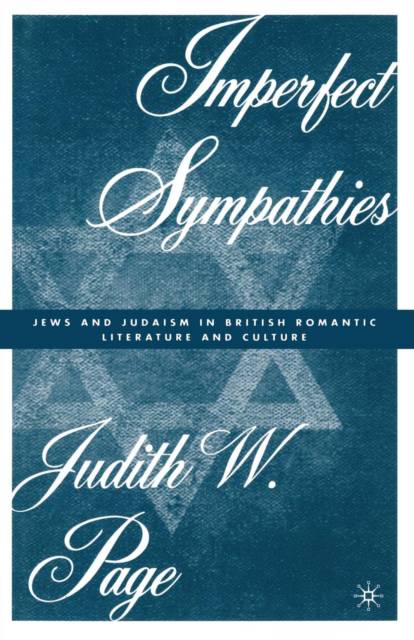
Bedankt voor het vertrouwen het afgelopen jaar! Om jou te bedanken bieden we GRATIS verzending (in België) aan op alles gedurende de hele maand januari.
- Afhalen na 1 uur in een winkel met voorraad
- In januari gratis thuislevering in België
- Ruim aanbod met 7 miljoen producten
Bedankt voor het vertrouwen het afgelopen jaar! Om jou te bedanken bieden we GRATIS verzending (in België) aan op alles gedurende de hele maand januari.
- Afhalen na 1 uur in een winkel met voorraad
- In januari gratis thuislevering in België
- Ruim aanbod met 7 miljoen producten
Zoeken
Imperfect Sympathies
Jews and Judaism in British Romantic Literature and Culture
J Page
Paperback | Engels
€ 83,95
+ 167 punten
Omschrijving
Judith W. Page argues that the 'cultural revolution' of sympathy and sentiment in British literature from 1770-1830 influenced the representations of Jews and Judaism. Page draws on historical materials and primary documents by and about Jews of the period, as well as a variety of authors and literary genres. She argues that there is a tension between the Romantic impulse to admire and sympathize with Jews and Judaism on the one hand, and the traditions of anti-semitism and conversionist philo-Semitism on the other. This often unresolved tension in the literature reflects the political and cultural struggles of the time, as well as the dilemma of Romanticism, which advocates sympathy but doesn't always accommodate difference.
Specificaties
Betrokkenen
- Auteur(s):
- Uitgeverij:
Inhoud
- Aantal bladzijden:
- 257
- Taal:
- Engels
Eigenschappen
- Productcode (EAN):
- 9781349388110
- Verschijningsdatum:
- 25/12/2015
- Uitvoering:
- Paperback
- Formaat:
- Trade paperback (VS)
- Afmetingen:
- 140 mm x 216 mm
- Gewicht:
- 317 g

Alleen bij Standaard Boekhandel
+ 167 punten op je klantenkaart van Standaard Boekhandel
Beoordelingen
We publiceren alleen reviews die voldoen aan de voorwaarden voor reviews. Bekijk onze voorwaarden voor reviews.









